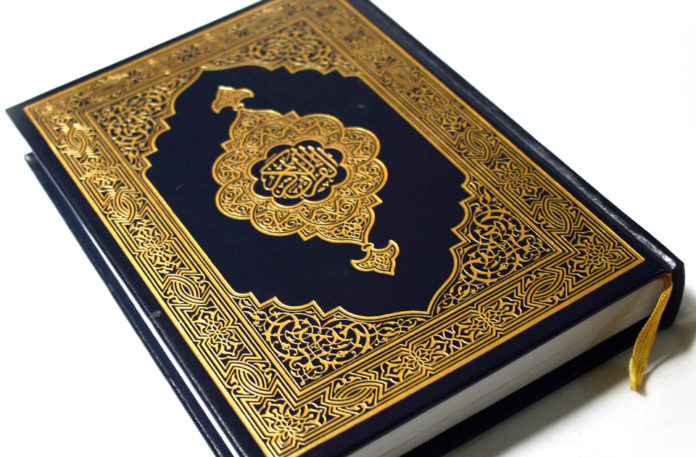If you ask what is the best method of tafseer, the answer is that the best way is to explain the Quraan through the Quraan. For, what the Quraan alludes to at one place is explained at the other, and what it says in brief on one occasion is elaborated upon at the other. But if this does not help you, you should turn to the sunnah, because the sunnah explains and elucidates the Quraan. Imaam Abu `Abd Allah Muhammad ibn Idrees al-Shaafi`ee has said:
| All that the Prophet, peace be upon him, has said is what he has derived from the Quraan. |
Allah has said:
| We have sent down to you the book in truth that you may judge between men, as Allah guides you; so dont be an advocate for those who betray their trust. [al-Quraan, 4:105] |
| We have sent down to you the message that you may explain clearly to people what has been sent to them, and that they think over it. [ 16:44 ] |
| We sent down the Book to you for the express purpose that you should make clear to them those things in which they differ, and that it should be a guide and a mercy to those who believe. [16:64] |
This is why the Prophet (sallAllahu `alayhi wa sallam) said:
| Know that I have been given the Quraan and something like it [Ahmad, Musnad, Vol. IV 131; Abu Dawood, Sunan, Sunnah, 5] |
Namely the Sunnah. In fact, the Sunnah, too has been given to him through wahy as the Quraan, except that it has not been recited to him as the Quraan. Imaam al-Shaafi`ee and other scholars have advanced a number of arguments in support of this point; but this is not the place to quote them. [For discussion see al-Shaafi`ee, al-Risaalah]
In order to understand the Quraan, you should first look to the Quraan itself. If that does not help, then turn to the Sunnah. The Prophet (sallAllahu `alayhi wa sallam) sent Mu`aadh (radiyAllahu `anhu) to Yemen and asked him:
| How will you judge the cases (that come to you)? He replied: I will judge according to the Book of Allah. But if you do not get anything there, what will you do?, the Prophet (sallAllahu `alayhi wa sallam) asked. He said: I will refer to the sunnah of the Prophet (sallAllahu `alayhi wa sallam). But if you do not get it even there, what will you do?, the Prophet (sallAllahu `alayhi wa sallam) asked again. He replied: I will exercise my judgment. Hearing this the Prophet (sallAllahu `alayhi wa sallam) patted Mu`aadh (radiyAllahu `anhu) on the shoulder and said: Praise be to Allah who has guided the Messenger of His Messenger to what pleases His Messenger. This hadeeth has been reported in the Musnad and Sunan collections of hadeeth with a good isnaad. [Ahmad, Musnad V:230, 236, 242; al-Daarimee, Sunan, Muqaddimah, 30; al-Tirmidhee, Sunan, Ahkaam, 3; Abu Dawood, Sunan, Adhiyah, 11.] |
When you do not get any help from the Quraan or the Sunnah, turn to the words of the companions. For they know the Quran better: they have witnessed its revelation, and passed through the situations in which it was revealed: and know it and understand it fully. This is particularly true of the scholars and leaders such as the four righteous caliphs and `Abdullaah ibn Mas`ood. Imaam Abu Ja`far Muhammad ibn Jareer al-Tabaree reports:
| Abu Kurayb narrated to us, saying: Jaabir ibn Nooh informed us that: al-A`mash informed us from Abu Duhaa: from Masrooq that `Abdullaah ibn Mas`ood said: By the one besides whom there none having the right to be worshipped, there is no verse in the Quraan about which I do not know in whose case and at what place was it revealed. If I were aware that anyone knew the Quraan more than me, and I could reach him, I would certainly have gone to see him. [Ibn al-Atheer, Jaami` al-Usool fee Ahaadeeth ar-Rasool, 1392/1972, Vol. IX p. 48.] |
Al-A`mash has also reported through Abu Waa`il that ibn Mas`ood said:
| When anyone of us learned ten verses of the Quraan, he did not proceed further unless he had known what they meant and what action they demanded. |
Another great scholar is `Abdullaah ibn `Abbaas (radiyAllahu `anhumaa), the nephew of the Prophet (sallAllahu `alayhi wa sallam) and the commentator of the Quraan. He attained that stature in virtue of the Prophets prayer:
| O Allah! Give him knowledge of Islaam and teach him the meaning of the Quraan. [Ahmad, Musnad, Vol. 1: 266, 314, 328, 335]. |
Muhammad ibn Bashshaar narrated to us, that Wakee` informed us, that Sufyaan informed us from al-A`mash: from Musim (ibn Sabeeh Abee Duhaa) from Masrooq: that `Abdullaah ibn Mas`ood (radiyAllahu `anhumaa) said:
| What a good interpreter of the Quraan Ibn `Abbaas is! |
Ibn Jareer has also reported this hadeeth through Yahyaa ibn Dawood, from Ishaaq al-Azraq, from Sufyaan, from al-A`mash, from Muslim ibn Sabeeh Abee Duhaa, from al-Masrooq with slightly different words:
| What a good interpreter Ibn `Abbaas is of the Quraan! |
He has also reported the same words through Bundar, from Ja`far ibn `Awn from al-A`mash. These words are, therefore, the actual words of Ibn Mas`ood (radiyallahau `anhumaa) which he said about Ibn `Abbaas (radiyAllahu `anhumaa). Ibn Mas`ood (radiyAllahu `anhumaa) died, most probably, in 33 A.H. Ibn `Abbaas (radiyAllahu `anhumaa) lived for thirty six years after him, and added a lot to the treasury of Islaamic knowledge.
Al-A`mash quotes from Abu Waa`il that Ibn `Abbaas (radiyAllahu `anhumaa) was appointed leader of the Hajj by `Alee (radiyAllahu `anhu); he delivered a sermon and read from Surah al-Baqarah, or Surah al-Noor according to another report, and explained it in such a way that had the Romans, Turks and the Dalamites heard it, they would have embraced Islaam. This is the reason why most of what Ismaa`eel ibn `Abd al-Rahmaan Suddee has written in tafseer consists of the explanations of these two scholars: Ibn Mas`ood and Ibn `Abbaas (radiyAllahu `anhum).
(NOTE: If you want to build a strong and powerful relationship with Allah, check out Islamia TV, where you can watch Islamic speakers from across the globe deliver inspiring and motivational courses. Learn more at www.islamia.tv.)


















